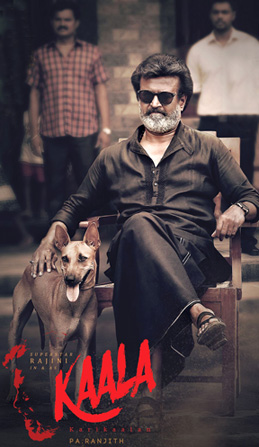 |
KAALA (Tamil/Hindi) - An ambitious, cliched, social-political drama that honestly gets rescued by Nana Patekar. (Review by Bobby Sing) |

A Rajinikanth film is nothing less than a big festival event for the trade as well as the fans without any slightest of doubt. And there ought to be genuine shouts, whistles and claps in the theater (other than the cleverly added ones in the background) in its every stylized scene, action and dialogue unconditionally.
So if that is what you wish to enjoy in a Rajnikanth film, then this is worth it, having enough meat for the cheers featuring a tough component as Nana excelling in his scenes together with Rajini ending with an appreciable climax.
|
09 Jun 2018 /
Comments (
4 )
ramji
That climax portion where pooja for rama destroys ravana was analogically refering to nana patekar as rama and rajini as ravanaa. According to dharavi people, rajini was considered as saviour, and for those live in city like you and me, it is nana was considered as saviour. So your analogical comparison was wrong. Huma qureshi role was not unimpressive compared to the previous heroine roles in a rajinikanths movie. The music here is jarring and aloud and it is why because the music comes from the mostly disadvantaged people from our society.So they are superiorly weak.So that anger and agitation and excitation has to be realized through music. Even michael jackson music also criticized samely liket hat of you. All rap pop rock blues are all came from oringinal american people who are all called blacks. Just come out of the bollywood world and seeing a tamil film plainly without any prejudice was really very difficult for any man but still i appreciate your talent. Last but not least, I just said my opinions. Ps: watch previous movie called Madras which certainly talks about lives of people living in North madras which is again a caste based but different story thats all.
Bobby Sing
Dear Ramji, 1. The reverse presentation of evil and good mentioned in the review is as per the colours given to them in their attires and it was not referring to the climax. The climax and Ramayan is mentioned further in the review focusing on Nana. So your interpretation of my interpreation stands fautly as you read something that wasnt written. 3. Regarding just a bollywood person seeing a tamil film...... it seems you havent visited my site and read my works at all on the Indian Cinema made in its regional language and just came here for the review of KAALA. So would kindly request to be my guest and spend some time at the site reading other articles on regional cinema gems too.
ramji
I am sorry for commenting wrongly. Regarding the music of this movie, what i tried to make you understand is that the movie makers wanted to go in the point of view of the Dharavi people about how they percieve the music.. Yourself had mentioned that composition and lyricss what important for the general masses. I also agree kaala is not a good place to go if we want to get touched through our soul. But Kannama (meaning Krishna in the form of female) song is Ok for me to touch the soul of my heart. Thank you
Bobby Sing
Its fine Ramji as we are all learners on the same path and talked for the first time only. |
Search